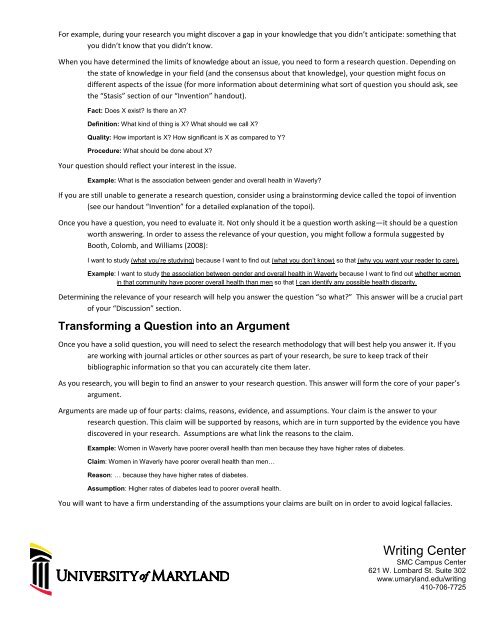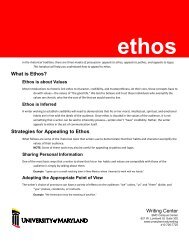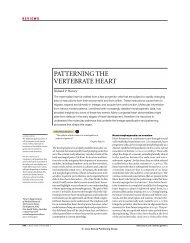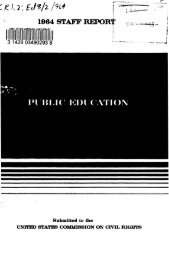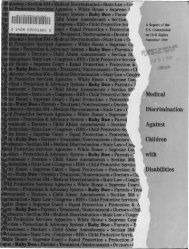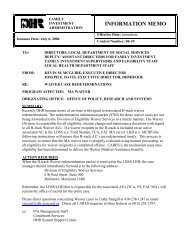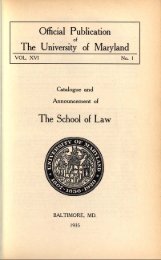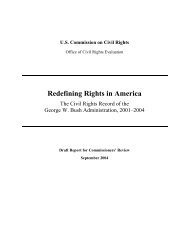Writing Process - University of Maryland, Baltimore
Writing Process - University of Maryland, Baltimore
Writing Process - University of Maryland, Baltimore
You also want an ePaper? Increase the reach of your titles
YUMPU automatically turns print PDFs into web optimized ePapers that Google loves.
For example, during your research you might discover a gap in your knowledge that you didn’t anticipate: something thatyou didn’t know that you didn’t know.When you have determined the limits <strong>of</strong> knowledge about an issue, you need to form a research question. Depending onthe state <strong>of</strong> knowledge in your field (and the consensus about that knowledge), your question might focus ondifferent aspects <strong>of</strong> the issue (for more information about determining what sort <strong>of</strong> question you should ask, seethe “Stasis” section <strong>of</strong> our “Invention” handout).Fact: Does X exist? Is there an X?Definition: What kind <strong>of</strong> thing is X? What should we call X?Quality: How important is X? How significant is X as compared to Y?Procedure: What should be done about X?Your question should reflect your interest in the issue.Example: What is the association between gender and overall health in Waverly?If you are still unable to generate a research question, consider using a brainstorming device called the topoi <strong>of</strong> invention(see our handout “Invention” for a detailed explanation <strong>of</strong> the topoi).Once you have a question, you need to evaluate it. Not only should it be a question worth asking—it should be a questionworth answering. In order to assess the relevance <strong>of</strong> your question, you might follow a formula suggested byBooth, Colomb, and Williams (2008):I want to study (what you’re studying) because I want to find out (what you don’t know) so that (why you want your reader to care).Example: I want to study the association between gender and overall health in Waverly because I want to find out whether womenin that community have poorer overall health than men so that I can identify any possible health disparity.Determining the relevance <strong>of</strong> your research will help you answer the question “so what?” This answer will be a crucial part<strong>of</strong> your “Discussion” section.Transforming a Question into an ArgumentOnce you have a solid question, you will need to select the research methodology that will best help you answer it. If youare working with journal articles or other sources as part <strong>of</strong> your research, be sure to keep track <strong>of</strong> theirbibliographic information so that you can accurately cite them later.As you research, you will begin to find an answer to your research question. This answer will form the core <strong>of</strong> your paper’sargument.Arguments are made up <strong>of</strong> four parts: claims, reasons, evidence, and assumptions. Your claim is the answer to yourresearch question. This claim will be supported by reasons, which are in turn supported by the evidence you havediscovered in your research. Assumptions are what link the reasons to the claim.Example: Women in Waverly have poorer overall health than men because they have higher rates <strong>of</strong> diabetes.Claim: Women in Waverly have poorer overall health than men…Reason: … because they have higher rates <strong>of</strong> diabetes.Assumption: Higher rates <strong>of</strong> diabetes lead to poorer overall health.You will want to have a firm understanding <strong>of</strong> the assumptions your claims are built on in order to avoid logical fallacies.<strong>Writing</strong> CenterSMC Campus Center621 W. Lombard St. Suite 302www.umaryland.edu/writing410-706-7725


